- Home
- Alice Walker
Living by the Word Page 9
Living by the Word Read online
Page 9
JOURNAL
August 19, 1983
At the hardware store in town I bought snapdragon-yellow paint for the privy. The walls will be yellow, to capture the sun and cheerfulness, and the seat will be marine blue. The door will be oriental red. I realize this sounds like a British telephone booth or perhaps a mailbox—except for the yellow.
Now I shall make a soup for lunch and perhaps put the finishing touches on my speech—or begin on the privy.
But meditate, I must!
Meditation was wonderful—forty-five minutes.
August 20, 1983
And great for peaceful dreams! Last night I had the most extraordinary, beautiful, and exquisite dream about myself and Langston Hughes. We were lovers. And he loved everything about me, even my shoes, which we were looking at, for some reason. We loved walking together. Talking. Laughing. He is so wonderful. We were at Margaret Walker’s house when he arrived, but she soon vanished. (It was as if she were the spirit connection.) And for an endless warm time we kissed and hugged and said “I love you. I love you.” It was one of the most enjoyable and fulfilling dreams I’ve ever had. We didn’t “make love,” we just loved. Deeply. So much so that this morning upon awakening and coming into the big room and facing the rainy day, it all came back to me and I began to cry because it was only a dream. But I felt Langston’s presence saying that for us the dream is real. That that can be our space, our place for being together, in love and happy. He asked me if I hadn’t found it good and happy and full. And I had to admit I had. He seemed to be, I would guess, in his thirties. Quite handsome and so sweet.
Langston, wherever you are, you make me very happy and I love you.
Perhaps I should do your collected poems, as a publisher has asked me to do. If I did I could be with you more!
October 30, 1983
The U.S. govt, has invaded Grenada. I’m almost too disgusted and angry to write. Maurice Bishop was killed, along with many members of his cabinet. Where are their bodies? I’ve been wondering. Reagan is a phantom of death. Dispatching Marines, watching them blow up other people, being blown up themselves. Smiling. No one, no soul, lives in the man. This is totally frightening. And I feel the whole country is just waiting for the planet to run aground. Despair, sadness, everywhere.
Meanwhile: Rebecca and I a cozy pair. This morning she was on the sofa in my study and fell asleep on my breast. It was so like the old days(!) when she was a baby. And she is like she was, more like herself. That is: cheerful and loving, affectionate, smart, and funny. The awful New York stranger who confused me with her stepmother seems to be gone. I hope so.
January 7, 1984
No matter in what anger I have written about the black man, I have never once let go of his hand. Though he has kicked me in the shins many times.
And here I am at the end of this notebook, started in 1976, nearly eight years ago!
There have been rough times, but, over all, I feel, continue to feel, blessed. In fact, when I consider the possibilities, and the realities of many other lives, I feel this intensely.
Next month I will be forty. In some ways, I feel my early life’s work is done, and done completely. The books that I have produced already carry forward the thoughts that I feel the ancestors were trying to help me pass on. In every generation someone (or two or three) is chosen for this work. Ernest Gaines is one such. Margaret Walker. Langston Hughes and Zora. Toomer. “One plum was left for me. One seed becomes an everlasting singing tree!” Or words to that effect.
Great spirit, I thank you for the length of my days and the fullness of my work. If you wanted me to move on, come home, or whatever is next, I would try to bear it joyfully. Though I am quite joyful here. I love Rebecca and Robert and Casey (Casey makes great fires and loves to be hugged). We are a family. This seemed an impossible dream so often, in this very book. And yet it is real.
Langston was right: the dream is real. And if we work at it hard enough, in the dream we will always have a place.
Thank you again. I love you. I love your trees, your sun, your stars and moon and light. Your darkness. Your plums and watermelons and water meadows. And all your creatures and their fur and eyes and feathers and scales.
A NAME IS SOMETIMES AN ANCESTOR SAYING HI, I’M WITH YOU
There are always people in history (or herstory) who help us, and whose “job” it is, in fact, to do this. One way of looking at history (whether oral or written) is as a method that records characteristics and vibrations of our helpers, whose spirits we may feel but of whose objective reality as people who once lived we may not know. Now these people—our “spirit helpers,” as indigenous peoples time after time in all cultures have referred to them—always create opportunities that make a meeting with and recognition of them unavoidable.
Sojourner Truth is one such figure for me. Even laying aside such obvious resemblances as the fact that we are both as concerned about the rights of women as the rights of men, and that we share a certain “mystical” bent, Sojourner (“Walker”—in the sense of traveler, journeyer, wanderer) Truth (which “Alice” means in Old Greek) is also my name. How happy I was when I realized this. It is one of those “synchronicities” (some might say conceits) of such reassuring proportions that even when I’ve been tempted to rename myself “Treeflower” or “Weed” I have resisted.
I get a power from this name that Sojourner Truth and I share. And when I walk into a room of strangers who are hostile to the words of women, I do so with her/our cloak of authority—as black women and beloved expressions of the Universe (i.e., children of God)—warm about me.
She smiles within my smile. That irrepressible great heart rises in my chest. Every experience that roused her passion against injustice in her lifetime shines from my eyes.
This feeling of being loved and supported by the Universe in general and by certain recognizable spirits in particular is bliss. No other state is remotely like it. And perhaps that is what Jesus tried so hard to teach: that the transformation required of us is not simply to be “like” Christ, but to be Christ.
The spirit of our helpers incarnates in us, making us more ourselves by extending us far beyond. And to that spirit there is no “beginning” as we know it (although we might finally “know” a historical figure who at one time expressed it) and no end. Always a hello, from the concerned spiritual ancestor you may not even have known you had—but this could strike at any time. Never a good-bye.
1986
A THOUSAND WORDS:
A WRITER’S PICTURES OF CHINA
In 1965 I stood next to a fellow American traveler in northern Uganda as he took a picture of a destitute Karamojan tribesman, who was, in fact, dying. The man was a refugee from ancestral lands to the south, now expropriated by another group, and had been forced to eke out what living he could in the barren north. He wore the briefest shredded loincloth, had at most a single tooth, and his eyes were covered with flies. He sat very still for the photograph (he had raised himself at our approach), and as we turned away held out his hand. The photographer gave him a quarter.
No doubt this memory is one reason I never travel with a camera. But another is my belief that human beings are already cameras, and that adding a second camera to the process of seeing (and remembering) shallows, rather than deepens, vision. When the TV commercial declares Kodak “the nation’s storyteller,” I shudder, because I realize our personal culture is about to become as streamlined as our public. But perhaps only poets and writers feel this.
In June of 1983 I went to China with a group of twelve American women writers that included Paule Marshall (our delegation leader), Nellie Wong, Blanche Boyd, Tillie Olsen, Lisa Alther, and my friend and travel companion Susan Kirschner, who took many beautiful pictures of our trip with a real camera, which she has shared with me, as I wish to share these imaginary or mental “snaps” with her and with the other members of our group.
1
This is a picture of Susan and me at the San Francisco ai
rport en route to China! We are leaning against the ticket counter furiously scribbling notes to our loved ones. I have chosen the same card for my daughter as for my companion. On a white background in large black letters above a vibrant red heart are the words I AM SO-O-O HAPPY WITH YOU!
So why am I going to China?
Whenever I fly, I fear I will not return to Earth except in shreds. As the plane lifts off I look at the Earth with longing and send waves of love to cover it as I rise.
How could anyone be foolish enough to leave the ground?
But you, I write to both of them, will also understand this contradiction in me: that I must fly to see even more of the Earth I love.
2
In this one Susan and I are on the plane somewhere over the Pacific reading identical copies of The True Story of Ah Q by the immortal Lu Hsun and drinking innumerable cups of Japanese green tea. In this story (1921), by the “father” of modern Chinese literature, a penniless peasant blunders his way into revolutionary pretense among local villagers, who hang him for his troubles. Lu Hsun depicts Ah Q as a foolish, childish person with no understanding of his emotions or his fate. We finish reading it about the same time and look at each other in quizzical disbelief. We feel Lu Hsun has condescended to his character, in precisely the way white Southern writers have condescended to their characters who are black. And as male writers condescend to characters who are women. That he, in fact, cannot believe a peasant capable of understanding his own oppression, his own life. Since the story is also exceedingly dull, we wonder what the Chinese value in it, beyond the fact that it is perhaps the first attempt to portray a Chinese peasant in fiction.
3
This one shows our arrival in Beijing. Not the actual landing and meeting with our interpreters and Chinese writer hosts, but the long drive from airport into town. Our first awareness is that though China’s people population is phenomenal, its tree population is more so: and they are a kind of planned magic. From the air they’re hardly visible because of the dust that sweeps down from the northern desert steppes and turns the landscape dun and yellow. And even when they first appear they seem modest and young, and one thinks of them in future tense. How grand they will look at eighty, and so on. But by the time one arrives on the streets of Beijing and notices veritable layers of trees five and six rows deep lining the broad boulevards a wonderful relief comes over the mind.
For one feels irresistibly drawn to people who would plant and care for so many millions of trees—and a part of this traveler relaxed. Because, for one thing, the planting of trees demonstrates a clear intention to have a future and a definite disinterest in war.
4
In this one, five members of our group are standing around the limited but adequate bar (orange crush, mineral water, beer, Coca-Cola) at the end of our floor in a hotel in Beijing. It is the day of our first long outing through the dusty streets of the city. Everyone is hot and thirsty. They are trying to decide whether to have orange crush, mineral water, or beer, like Americans who know what is going on. The look of dismay on their faces is because I have just walked up to the counter and said to the barkeep: I’ll have a Coke.
I take the Coke into the room I share with Susan, drink some, and pour some out the window in libation. I save the bottle cap with “Coca-Cola” written in Chinese. Wherever I go in the world I buy one Coca-Cola in memory of the anonymous black woman who is said to have created it (probably on the theory that if you dope your masters—I have heard that Coke used to have coke in it—they’re more pleasant).
I never heard of that, says Susan.
And I tell her it is the one thing I remember from my high-school graduation day. Our commencement speaker, Mr. Bullock, a horticulturist of stature from Atlanta, tried for thirty minutes to inspire pride of heritage in us by listing name upon illustrious name of heroic and creative black folk. People nodded. But when he said: Even Coca-Cola was invented by a black woman, everybody snapped awake. For didn’t most of us drink this part of the heritage every day?
I tell Susan that in Collonwalde, the Coca-Cola mansion outside Atlanta, there is a statue of a black woman in the foyer, but nobody I asked about her seemed to know who she was or why she’s there.
I laugh. It doesn’t matter, really (though what a story there must be behind this story, I think). There’s too much sugar in Coke. I’m sure the original was much better. It may even have been created as a medicine. We run that down a little, start talking about the two most insidious poisons loose in the world today: sugar and cocaine; and soon drift off to sleep.
5
In this one I am wearing a large mulberry-colored coat several sizes too big, a long grape-colored scarf, a Chinese peasant hat the size of an umbrella, and am carrying a cane with a dragon carved on it. We have just stopped twenty miles upriver from the town of Guilin (after a stunning boat ride through mountains that look like stone trees), and the peasant merchants from the surrounding countryside have ambushed us on the shore. Their one American word is “hello,” which they say with the same off-key intonation that I’m sure we say “nee-how” (phonetic Chinese for “hello”). In their mouths it becomes a totally different word. It is like meeting a long line of people and each one solemnly greets you with “Elbow.” I fantasize that my “nee-how” probably sounds like, say, the Chinese word for “foot” to them. So all during this trip I’ve been smiling and saying “hello” and they’ve been hearing “foot, foot, foot.”
Looking closely at this picture I see that I am also wearing very baggy pants. In fact, everything I’m wearing is several sizes too large. I realize we were asked by our tour leader not to wear tight, uncomfortable, or revealing clothes, but the overall looseness of my attire appears extreme.
I suspect, looking at this picture, in which I look ridiculous, but regal, that this outsize dressing is typical of people—especially women—who grow up in families whose every other member is larger than they are. Which is true in my family. We can’t believe we’re as small as we are. And so, we dress ourselves as if we were they.
6
This is a picture of a university dormitory in Guilin. It is early evening as Susan and I walk across the campus on our way to visit families of Susan’s Chinese acquaintances in Portland. As is true everywhere in China, there is no wasted electricity (lighting is mellow rather than bright; forty watts rather than a hundred) and no unused space. In rooms smaller than those two U.S. college students would share, five and six students bunk. Freshly washed clothes hang everywhere inside the rooms, and outside the windows on long bamboo poles. The students we meet on the path are returning to the classrooms, which double as places of study at night. We watch rows and rows of them bent silently, intently, over their books.
Of course I think of Hampton Institute, Tuskegee, the early days of Morris Brown, Morehouse, and Spelman, black colleges started just after the Civil War in barracks and basements: poor, overcrowded, but determined to educate former peasants and slaves; schools that have also, like the Chinese schools, managed against great odds to do just that.
7
You would never believe, from this photograph, that I am sitting on the Great Wall of China. I look bored. I look unhappy. There is that tense line around my mouth that means I’ll never come thousands of miles to see more of man’s folly again. What I hate about the Great Wall is the thought of all the workers’ bodies buried in it. I hate the vastness and barrenness of its location. I hate the suffering the women and children attached to the builders endured. I hate its—let’s face it, I hate walls.
Susan dashes ahead of me looking for the best view. But the wall tires me, instantly. It is the concrete manifestation of so much that is wrong (a kind of primitive MX). What a stupid waste, I am thinking, in the photograph. A lot of flowers never sniffed. A lot of dancing never done.
The brochure about the wall says that the invaders, finding the Great Wall indeed impenetrable, simply got over it by bribing the guards.
The Great Wall is
redeemed by only one thing: over each battlement portal (through which hand-propelled missiles must have whistled) there is a tiny decoration, serving no purpose whatsoever except to refresh the eye. And here is where the writer could benefit from having had a camera other than herself, because I feel deeply about this decoration, this modest attempt at art. I send mental salutations to the artist(s). But now I cannot remember what precisely the decoration is: is it a curled line, horizontal and short, like those on the windows of brown-stones? Is it the missing flower? Or is it two straight lines from a hexagram symbolizing war, which I have mistaken for peace?
8
This one is of me and Susan walking across T’ien An Men Square looking at the many fathers out for a stroll with their female children. They all look interested, relaxed, happy. Susan stops one little girl and her father and asks if she may take a picture. At first he looks suspicious, or, more accurately, puzzled. We begin to ooh and aah over his child, a serene three-year-old with an enormous red ribbon in her hair. He understands. And beams with pride. Then we notice that street signs at crossings between the Forbidden City and the square depict just such a pair as we photographed: pearl gray against a blue background without letters of any kind, the outline of a father and daughter holding hands, crossing the street.

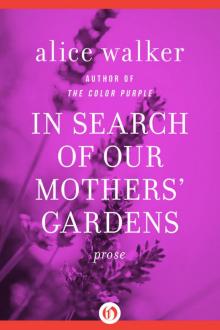 In Search of Our Mothers' Gardens: Prose
In Search of Our Mothers' Gardens: Prose In Love and Trouble: Stories of Black Women: Stories of Black Women
In Love and Trouble: Stories of Black Women: Stories of Black Women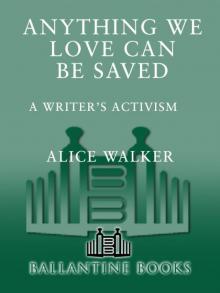 Anything We Love Can Be Saved
Anything We Love Can Be Saved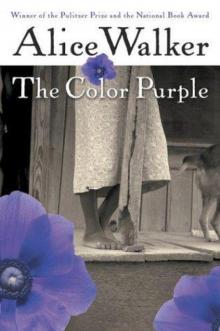 The Color Purple
The Color Purple By the Light of My Father's Smile
By the Light of My Father's Smile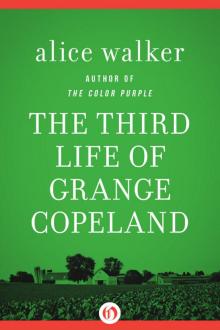 The Third Life of Grange Copeland
The Third Life of Grange Copeland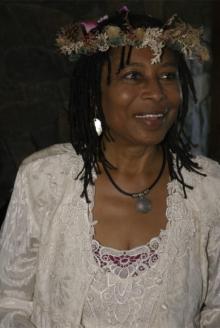 You Can't Keep a Good Woman Down
You Can't Keep a Good Woman Down The Temple of My Familiar
The Temple of My Familiar Possessing the Secret of Joy
Possessing the Secret of Joy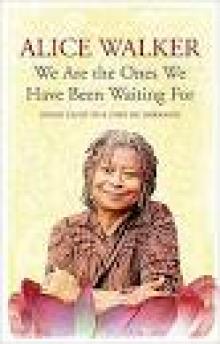 We Are the Ones We Have Been Waiting For
We Are the Ones We Have Been Waiting For The Way Forward Is With a Broken Heart
The Way Forward Is With a Broken Heart Meridian
Meridian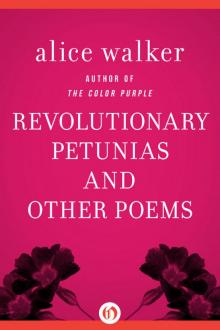 Revolutionary Petunias
Revolutionary Petunias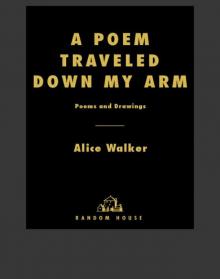 A Poem Traveled Down My Arm
A Poem Traveled Down My Arm Once
Once Horses Make a Landscape Look More Beautiful
Horses Make a Landscape Look More Beautiful Living by the Word
Living by the Word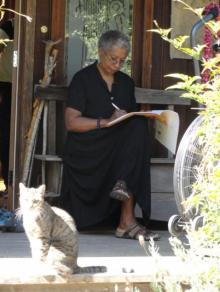 In Love and Trouble
In Love and Trouble The Color Purple Collection
The Color Purple Collection Now Is the Time to Open Your Heart
Now Is the Time to Open Your Heart Color Purple Collection
Color Purple Collection Taking the Arrow Out of the Heart
Taking the Arrow Out of the Heart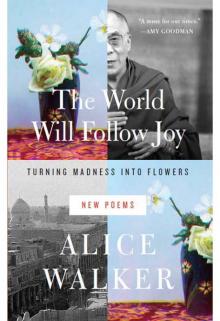 The World Will Follow Joy
The World Will Follow Joy Meridian (1976)
Meridian (1976) Absolute Trust in the Goodness of the Earth
Absolute Trust in the Goodness of the Earth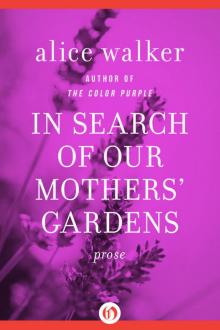 In Search of Our Mothers' Gardens
In Search of Our Mothers' Gardens